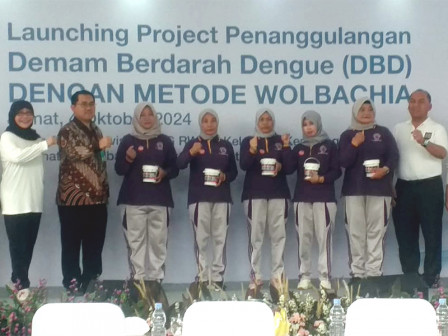

Friday, October 4th 2024 Reporter: TP Moan Simanjuntak Translator: Rizky Mawardi 924

(Foto: TP Moan Simanjuntak)
Jakarta Provincial Government launched dengue fever handling program with Wolbachia Aedes Aegypti mosquito at Taman Agro Eduwisata GSG RW 07, Kembangan Utara Urban Village, Kembangan Sub-district, Friday (10/4). Kembangan Sub-district becomes the first location of program, implementation.
Kembangan Sub-district has high population.
The launching was attended by Acting Director General of Disease Prevention and Handling of Health Ministry, Yudhi Pramono; Acting Assistant for Public Welfare of Jakarta Regional Secretary, Suharini Eliawati, West Jakarta Mayor, Uus Kuswanto, and Jakarta Health Agency Head, Ani Ruspitawati.
West Jakarta Mayor, Uus Kuswanto, explained the series of dengue fever handling using the Wolbachia method in West Jakarta has begun since the area was declared as one of the locations for implementing the program in 2023. The implementation is based on Health Minister Decree No 1341/2022 about the Implementation of Wolbachia as an Innovation for Handling Dengue. West Jakarta was selected as one of five selected cities like Semarang, Bandung, Kupang, and Bontang.
"We also help the residents to understand this program by providing training for Jumantik (Larvae Monitoring Personnel) cadres. Socialization and education are carried out massively throughout West Jakarta with various methods, both face-to-face, social media, webinars, leaflet distribution, and through other information channels," said Uus, as quoted from Jakarta Provincial Government's press release.
Uus added his party also collecting foster parents who are willing to be entrusted with buckets containing Wolbachia mosquito eggs. The number of foster parents in Kembangan Utara has reached 1,185 people.
Kembangan Sub-district was chosen as the first location releasing Wolbachia mosquito since the area had the highest dengue fever rate in 2023 with an incidence rate of 54.1 per 100,000 residents.
"Kembangan Sub-district has high population. The residents also known to be friendly and like to work together. So they are agree to release the mosquito," Uus added.
He also explained that the increase in dengue fever cases in West Jakarta in 2024 had occurred since February and peaked in April with 799 cases. From March to June 2024, the number of cases was above the maximum value in the last five years. Furthermore, cases began to decline in July and in September there were 73 cases.
Meanwhile, Acting Director General of Disease Prevention and Handling of Health Ministry, Yudhi Pramono, stated Wolbachia is a natural bacteria commonly found in arthropods or insects that can inhibit the replication of the Dengue virus in the mosquito's body. Research in Yogyakarta has shown that this technology can reduce the incidence of Dengue cases by 77 percent and reduce hospitalizations by 86 percent.
"The Indonesian Ministry of Health has adopted Wolbachia technology by conducting pilot projects in five cities, namely Semarang, West Jakarta, Bandung, Kupang, and Bontang. I hope that the Wolbachia technology pilot project in the West Jakarta can be a momentum to show that Dengue control can be successful if it is a joint commitment between the Central and Regional Governments and related stakeholders," he stated.
The Health Ministry also thanked Jakarta Provincial Government for supporting this dengue fever handling innovation.
"Health Ministry has prepared support such as providing Wolbachia eggs from Gadjah Mada University Yogyakarta, training for field personnel, field coordinator, Quality Assurance Tests, Quality Control by UGM, Jumantik bags for cadres, and 30,000 Wolbachia buckets," he added.